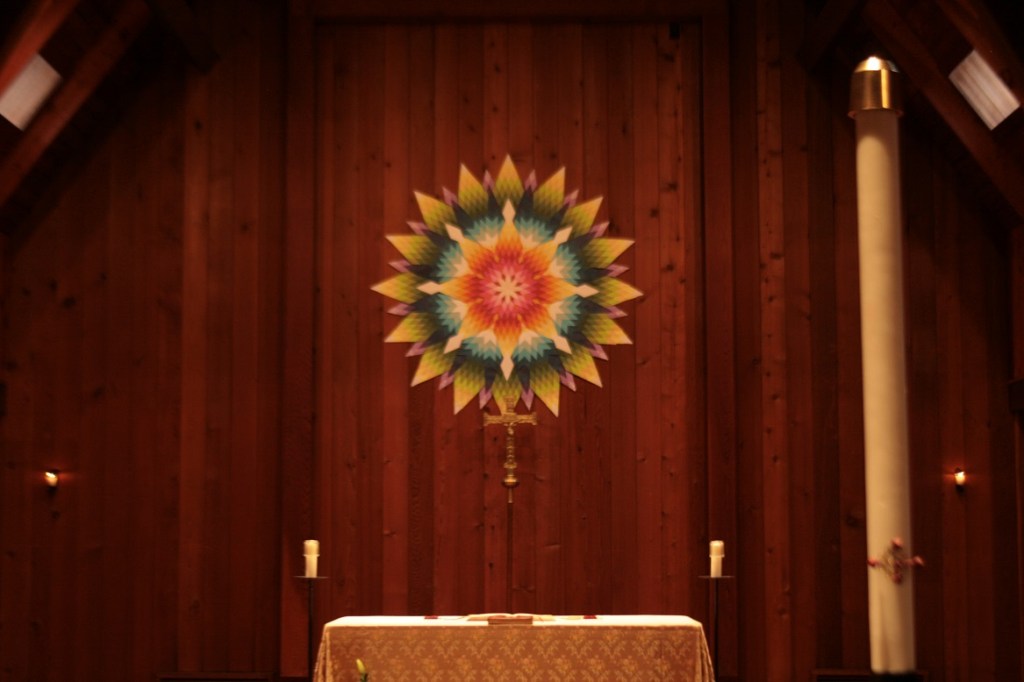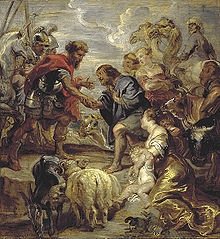
One of the more startling and memorable things Benedict says in his Rule comes towards the end of his instructions for keeping a holy Lent. After listing several acts of self-denial that one might do, he then says “and look forward to holy Easter with joy and spiritual longing.” (RB 49: 7) One can be pardoned for looking forward to not having to keep up these extra acts of self-denial. Perhaps one can even be pardoned for looking forward to eating Easter candy. However, since Easter candy hadn’t been invented in Benedict’s time, it could hardly have been on his agenda. Moreover, looking forward to Easter with holy longing suggests something else than creature comforts, even if they might be included. This looking forward is on a whole different plane than, say, looking forward to three broken ribs healing so that I feel better. Besides, since Benedict says that we really should keep Lent all year long, he isn’t encouraging us to give up the self-denial we practiced during the season. Then there is the matter of what Benedict means by joy. The joy with which we look forward to Easter seems to be a present reality, not just a future one. That is, we experience the joy of Easter in the here and now as we look forward to it. In this short but rich fragment of one sentence, Benedict expresses a profound devotion to the Resurrection of Jesus and the joy we should experience in the risen Lord, even in the midst of self-denial.
We can deepen our perspective on Benedict’s devotion to Easter by taking note of the role of the suffering of Christ in the Rule. This is most strongly expressed in the fourth step of humility where Benedict says that we are obedient “under difficult, unfavorable, or even unjust conditions” at which time we “quietly embrace suffering.” (RB 7: 35) It isn’t that Benedict is in favor of acting unjustly. On the contrary, Benedict wants his monastics to prefer the good of others over one’s own. But if one should suffer injustice, the model of the suffering Christ is the model to follow. Anyone suffering in such circumstances would have all the more reason to look forward to Easter with holy longing even in the midst of such trials
Now that Easter has come and we are celebrating the feast, is this what we were looking forward to? What we have in the Gospel is a far cry from trumpets and dancing in the streets, let alone eating Easter candy. Instead, we have two demoralized women coming to the tomb to do reverence for the body of Jesus. They are shaken by an earthquake, by an empty tomb, and then by the appearance of an angel dressed in dazzling white. The angel tells the women not to be afraid. What are they afraid of? Probably many things, not least the Roman authorities. But probably the greatest fear is that things seems to be taking a most unexpected turn and they don’t know which end is up. From our vantage point, we might think there is no reason to be afraid of the Resurrection of Jesus, and it is hard to put ourselves in their position. Remember, we were looking forward to Easter because we know how this story ends. But the women were in the middle of the story, and even when they met with Jesus himself, they were hardly in a position to understand what was happening and where it would lead. What we have to remember is that the disciples of Jesus were not looking forward to Easter; they were mourning the loss of their leader. That was bad enough, but at least mourning a death is intelligible. Encountering a risen Christ is a different matter. How can anyone make sense out of that?
The disorientation of the women and then of the other disciples can give us some insight into what it means to look forward to Easter. By knowing the ending, or so we think, we think we know basically what Easter is all about, but do we? What does it really mean that Jesus is risen from the dead and lives forever, not only in the heavenly realms but also in the midst of humanity, in each human heart, and in all of nature? How do we live our lives in the risen Lord? Do we really know all that much more than the disciples did at the time? And does Benedict want us to stop looking forward to Easter once Easter Day comes? Surely not! Perhaps, part of living a perpetual Lent is looking forward to Easter all year round, not least during the Easter season. A small but telling liturgical hint is that Benedict would have us say the Easter Alleluia at the Divine Office throughout the year except during Lent. Why should we look forward to Easter all the time? For the simple reason that we don’t and can’t understand it. We only have a sense that something amazing and joyous has happened, something we can’t take in. So the best we can do is reflect deeply on the resurrected life that Jesus is sharing with all of us and keep looking forward to having more of that life to look forward to.


 Abraham’s call to leave his country and kindred has been a monastic trope ever since there was a monastic presence in Christianity. Entering the monastic life does entail leaving behind the life one had been leading up to that time. It is also a venture into the unknown. Reading books on monasticism or even visiting monasteries do not fully prepare one for life after actually entering. The author of Hebrews said that Abraham did not know where he was going and lived “as in a foreign land.” (Heb. 11: 9) The author of Hebrews was not writing for monastics but for a Christian community under pressure. For this author, all Christians have “no lasting city. (Heb. 13: 14) Abraham did not simply turn his back on his family and his culture. God told him that he would “be a blessing” and through whom all families would be blest. (Gen. 12: 3) This would include being a blessing for the family he had left behind. Monks, for that matter remain involved with their families of origin and offer help when it is needed. Benedict himself had left the Roman culture of his time in which we was well-placed socially to enter a new life in which he became a pioneer for many sons and daughters in the millennium and a half since his life.
Abraham’s call to leave his country and kindred has been a monastic trope ever since there was a monastic presence in Christianity. Entering the monastic life does entail leaving behind the life one had been leading up to that time. It is also a venture into the unknown. Reading books on monasticism or even visiting monasteries do not fully prepare one for life after actually entering. The author of Hebrews said that Abraham did not know where he was going and lived “as in a foreign land.” (Heb. 11: 9) The author of Hebrews was not writing for monastics but for a Christian community under pressure. For this author, all Christians have “no lasting city. (Heb. 13: 14) Abraham did not simply turn his back on his family and his culture. God told him that he would “be a blessing” and through whom all families would be blest. (Gen. 12: 3) This would include being a blessing for the family he had left behind. Monks, for that matter remain involved with their families of origin and offer help when it is needed. Benedict himself had left the Roman culture of his time in which we was well-placed socially to enter a new life in which he became a pioneer for many sons and daughters in the millennium and a half since his life.




